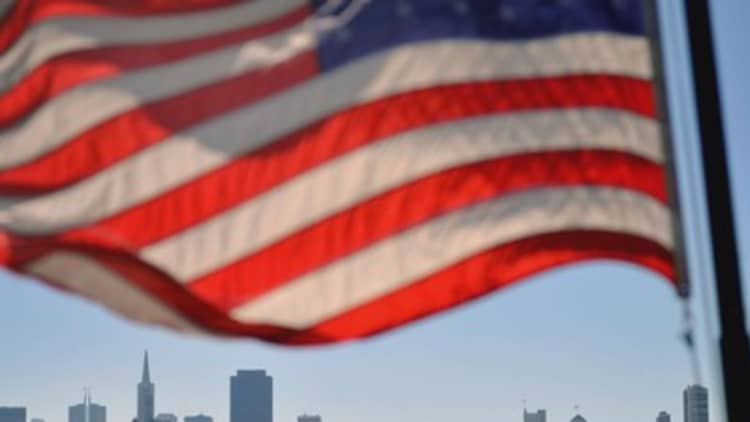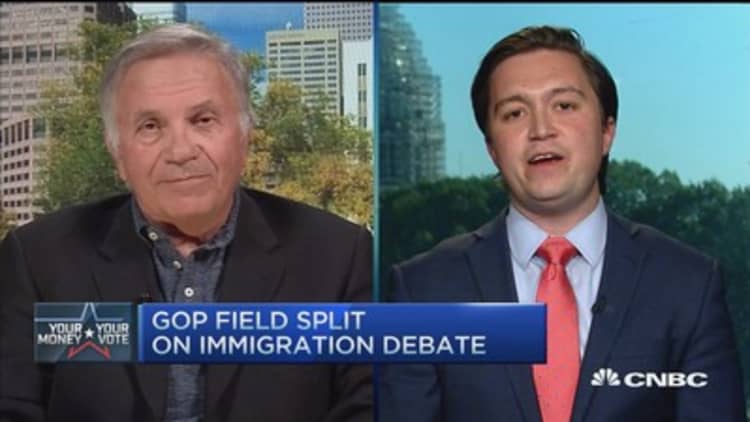Technology's moneyed executives from Northern California are sending their political contributions clear across the country — to Florida.
Headed into Wednesday's Republican presidential debate hosted by CNBC, Sen. Marco Rubio and former Gov. Jeb Bush are dominating when it comes to fundraising from the tech industry.
Determining why takes some guesswork. Candidates have been vague on their tax-related policies and, aside from ex-Hewlett-Packard CEO Carly Fiorina, none of them has any real track record in the tech sector or in California. Donald Trump has said he's mostly self-funding his campaign.
Read MoreBush downsizes campaign costs
But there's one issue of particular importance in tech that favor Rubio and Bush: immigration.
Rubio, whose parents are from Cuba, and Bush, whose wife is Mexican-American, have advocated for a path to legal residence for at least some undocumented immigrants, in contrast to the more aggressive anti-immigrant rhetoric from Trump.
The tech industry is teeming with foreign-born founders, executives and investors.
"Having access to an educated workforce now means bringing people in from other places, and tech companies are very sensitive to that," said Barbara O'Connor, director of the Institute for the Study of Politics and Media at California State University, Sacramento. "They all favor special guest worker programs."

Rubio leads the field, having raised $3.2 million from the tech industry, followed by Bush at $1.5 million, according to Crowdpac, an independent provider of campaign data. Democrats Hillary Clinton and Bernie Sanders have raised $502,000 and $189,000, respectively.
The numbers are skewed by a $3 million check to Rubio's Conservative Solutions PAC from Oracle founder .
In terms of contributions sent directly to the candidates from the tech hub of Silicon Valley and San Francisco, Bush has raised $483,700 to Rubio's $378,137, according to the Federal Election Commission. The next highest amount among Republicans is Fiorina with $162,791, followed by Ben Carson at $151,665.
Oracle co-CEO Mark Hurd, Cisco Chairman John Chambers and Seagate CEO Steve Luczo all wrote checks for Rubio. Bush has done well with venture capitalists such as Stewart Alsop, Dixon Doll, Dick Kramlich, Bill Draper and Doug Leone. Other donors include Yahoo CFO Ken Goldman and former eBay CEO John Donahoe, who also gave money to Clinton.
Democrats still dominate the region, with Clinton having raised $4.2 million and Sanders reeling in $491,519 from ZIP codes in San Francisco and Silicon Valley.
Alsop, co-founder of venture firm Alsop Louie Partners in San Francisco, met Bush in July at a fundraiser hosted by Cavalry Asset Management Chief Investment Officer John Hurley. Alsop said that while immigration is important, it's certainly not the only issue or necessarily even the most important.
"I'm not really worried about whether one candidate will do something with immigration or cybersecurity as much as who seems to understand what the hell we do," said Alsop. "It's driven much more by the connection to entrepreneurship."
For others in tech, immigration is a central theme.
Read MoreImmigration reform confounds GOP
James Beshara, CEO of crowdfunding start-up Tilt, didn't disclose his preferred candidate, but he did say that immigration reform is a unifying issue in the tech industry and the most significant measure the next president can take to foster innovation.
"That's probably something that a lot of founders, especially folks in Silicon Valley, might say. It's a common theme for a reason," Beshara said in an interview with CNBC. At Tilt, "half of the company is either not from the U.S. or is first generation or second generation sons or daughters of immigrants."
Crowdpac scores candidates on the major campaign issues. When it comes to immigration, Rubio and Bush get scores that are to the left of the average Republican while still to the right of center.

Rubio, who in 2013 helped push immigration reform through the Senate, has said that while he supports a path to legalization, the U.S. still needs a better system for verifying who can legally work here as well as a tracking system to make sure visitors don't overstay their welcome. "Despite our generosity, we're being taken advantage of," Rubio said in a previous debate.
As part of Bush's campaign, the author of a 2013 book titled "Immigration Wars" also hedges his pro-immigration stance. While sympathetic and supportive of alternatives to deportation, Bush can score points with conservatives with his tough talk on border security.
"Finding a practical solution to the status of the people who are here illegally today is a nonstarter if our borders are not secure against future illegal immigration," Bush says on his website.
It's still early. Many of the big money donors will likely wait until after the primaries to open their wallets. That's when they can expect to hear more about topics that will affect their business like tax policies, regulation and trade.
— CNBC's Jeniece Pettitt contributed to this report.
Watch CNBC's "Your Money, Your Vote: The Republican Presidential Debate" on Wednesday, October 28. The debate will feature two sets of candidates discussing critical issues facing America today, including job growth, taxes and the health of our economy. Coverage begins at 5pm E.T.



